Three weeks of terror: How the D.C. snipers scared the capital and why one suspect could soon be released
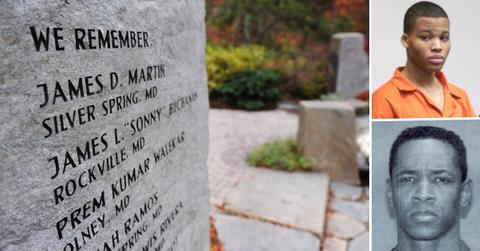
In 2002, two snipers murdered 17 people and injured ten in a multi-state shooting spree. Their violent path swerved to a dead end in a rest-stop, where they were arrested sleeping in their car after terrorizing the Washington D.C. area for three weeks.
Their spree left a nation scared during the attacks, and the nation was shocked when they learned about the suspects.
One of the men is dead, but the other--only 17 at the time--recently got married in Virginia prison. Lee Boyd Malvo will likely be paroled in 2022 due to a change in juvenile sentencing laws in 2017.
Innocent civilians who were shopping, pumping gas or just walking down the street were shot dead in the capital. The media dubbed them the “Beltway Attacks.” It was later revealed more than one person was behind the shootings
John Allen Muhammed, 41, and his accomplice, Malvo, murdered ten people in Washington D.C., Virginia, and Maryland between Oct. 2 and Oct. 22. Law enforcement hunted them down in their vehicle, which they used as a concealed hiding spot for their sniper murder plot.
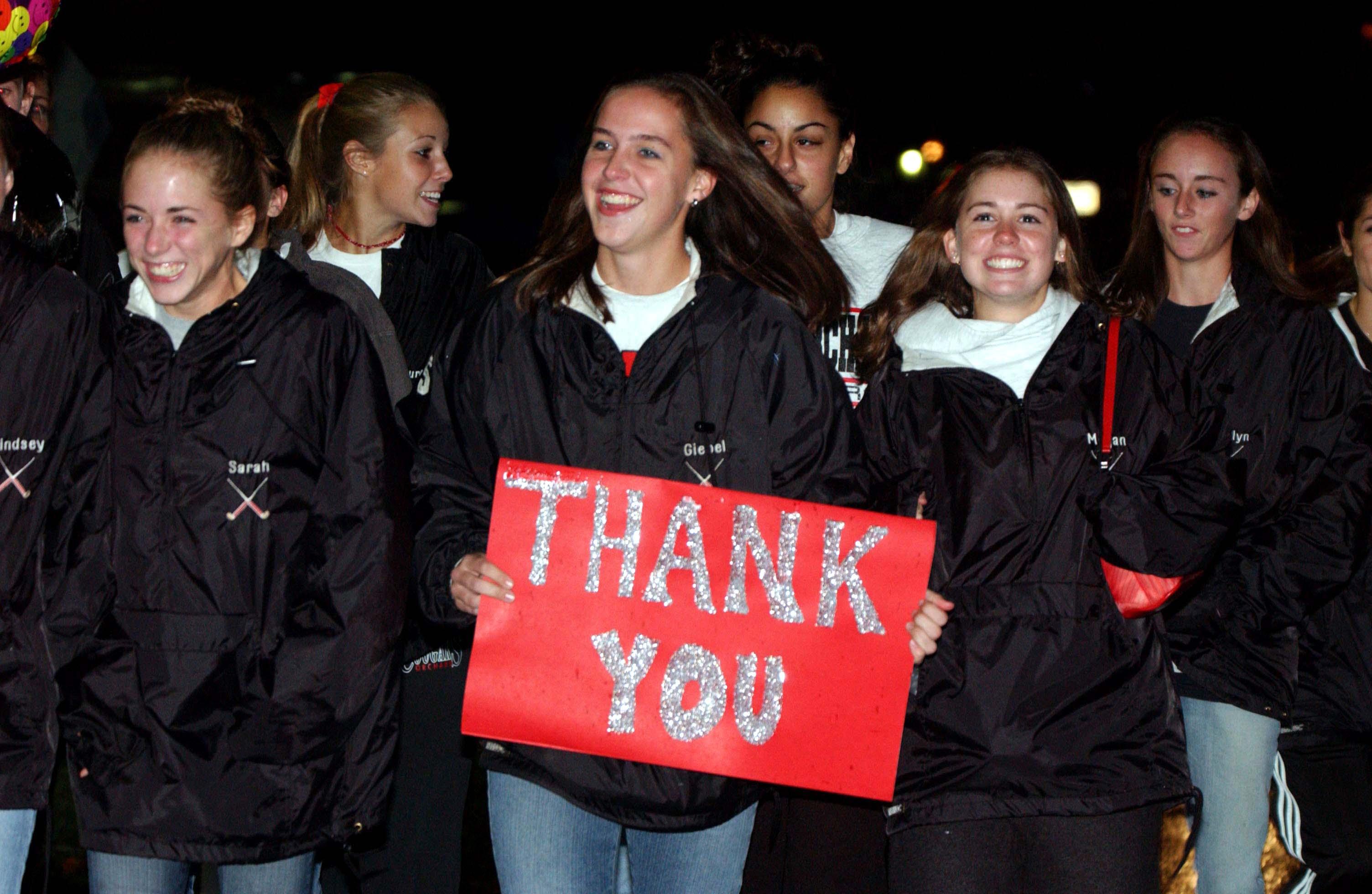
People gather after the D.C. snipers were arrested.
Prior to the three-week rampage, both were implicated in ten shootings around the country, leading to five deaths between February and September 2002.
Muhammed received the death penalty in 2004, and after his appeals ran out, he was executed by lethal injection in 2009.
Today, Lee Malvo is 36 years old. He is serving time in a Virginia prison. Many believe his older partner, Muhammed, was the major force behind the violence and persuaded the teen to do his bidding.
In a 2012 interview with The Washington Post Malvo described himself: "I was a monster. If you look up the definition, that's what a monster is. I was a ghoul. I was a thief. I stole people's lives. I did someone else's bidding just because they said so.”
TERRORIZED EVERY CITIZEN
Their shooting spree began with a non-lethal incident in Aspen Hill, Maryland, on Oct. 2, 2002. Although ballistics evidence never tied the D.C. snipers to the recovered bullet, authorities believe a single shot through the store window of a Michael’s craft shop was the first shot in the spree.
That same day, James D. Martin, 55, was walking through the parking lot of a Shopper’s Food Warehouse and was shot dead. Martin worked as a program analyst for the federal government.
The first six shootings occurred in Maryland, where densely populated D.C. suburban communities. Montgomery County police led the initial investigation because of where the first victims died.
By the second shooting, the FBI had assigned over 50 agents, giving the investigation the code name “SNIPEMUR” while various federal and local agencies, including the Bureau of Alcohol, Tobacco, Firearms and Explosives and the Baltimore SWAT team, were deployed.
On Oct. 3, Muhammed and Malvo began scoping out nearby Rockville. They saw a man mowing a lawn at an auto mall, took aim, and fired. He was James Buchanan, a 39-year-old professional landscaper, and he died within minutes.
Typically, Malvo would scope out the scene with binoculars and radio to Muhammed it was a clear shot. Muhammed sometimes set up his sniper’s nest at a distance, using natural cover.
Oct. 3rd was a warm fall day and the deadliest of the spree. Over the next several hours, the pair of killers drove to various random locations, parked, scanned the area with binoculars and randomly shot people down in the streets.
They next drove back to Aspen Hill, where they found Premkumar Walekar, 54, gassing up his taxicab for a day of work. They shot the cab driver dead in the Mobil station parking lot.
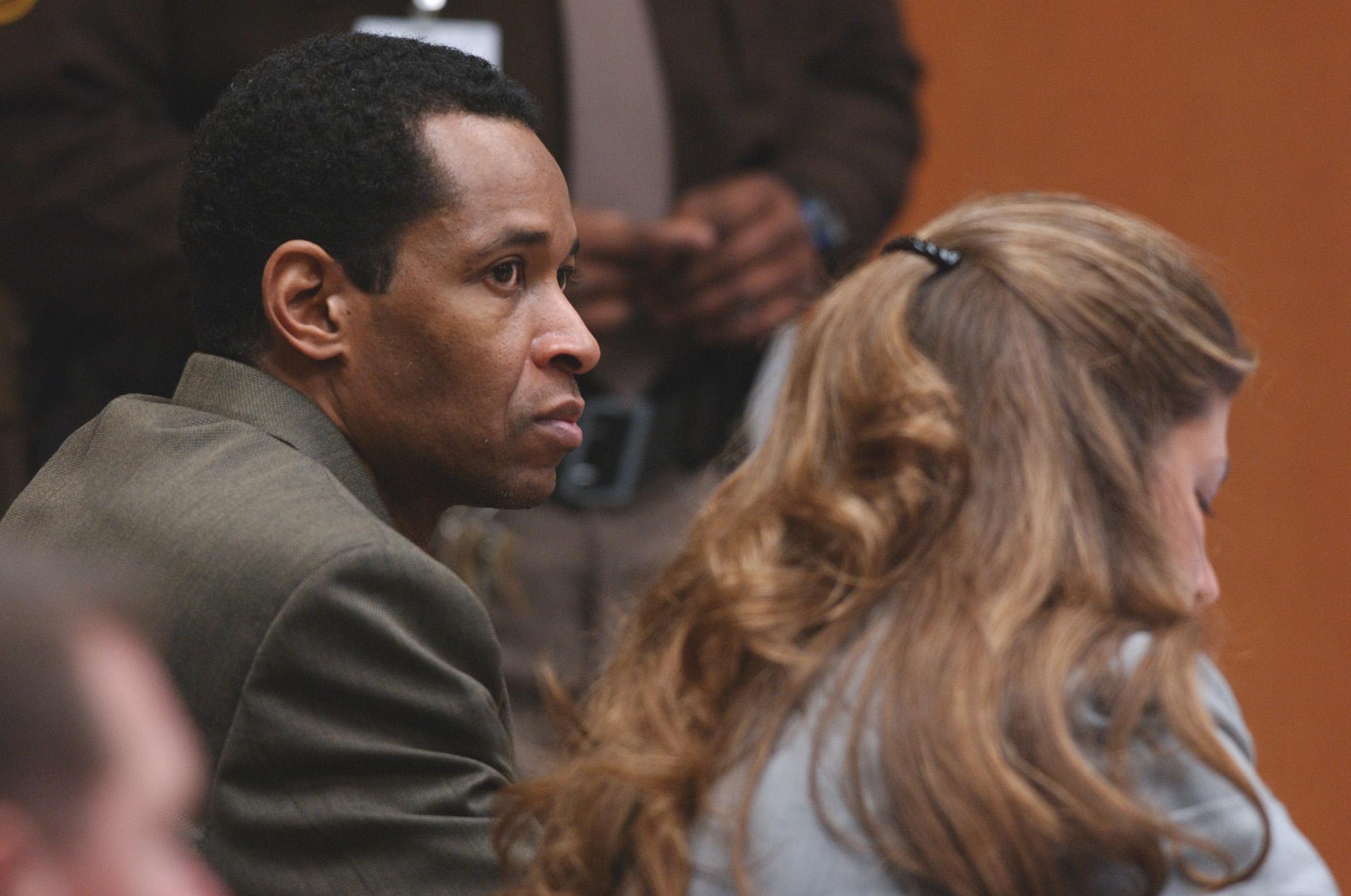
John Allen Muhammed at his trial.
In Silver Spring, Maryland, Muhammed steered the blue Caprice into the parking lot of the Leisure World Shopping Center just before 8:30 a.m. Sarah Ramos, 34, was sitting on a bench outside the post office enjoying a pleasant, sunny morning. She was shot in the head and died instantly. A witness reported seeing a white vehicle speed away.
Lori-Ann Lewis-Rivera was shot in the head while vacuuming out her mini-van at a Shell station. She died at the scene.
The last shooting for this day occurred in D.C.—and it was the only murder by Muhammed and Malvo in the city itself. After dark, they gunned down Pascal Charlot, 72. Charlot sustained a single gunshot to the chest as he stood on a street corner. He was rushed to a nearby hospital, where he died within the hour.
WEEKS OF FEAR
Over the next two weeks, there would be seven more shootings. A few victims survived, as Malvo and Muhammed seemed to get sloppier.
On Oct. 4th, Caroline Seawell was in the process of filling her Toyota mini-van with shopping bags. The 43-year-old mother of two was in the parking lot of a Michael’s store when she was shot. The bullet ripped through her liver, lung and diaphragm, breaking several ribs. Emergency services transported her to Fairfax hospital, where she recovered sufficiently to be released 10 days later.
The pair of spree killers, now known as the Beltway Killers, took a break for a few days.
People in the D.C. area began to change their habits. Some hid behind their cars while filling them with gas, others only left the house when absolutely necessary. After the next incident, parents kept a closer eye on their children.
On Oct. 7, Muhammed and Malvo parked near the Benjamin Tasker Middle School in Bowie, Maryland. They aimed their weapon on a student, 13-year-old Iran Brown, and fired. They hit Brown in the abdomen and critically wounded him as he stood in the school driveway drop-off lane. Miraculously, he survived and later testified at Muhammed’s trial.
The police found the first piece of evidence at the middle school, a card from the Tarot deck: Death. On it, the words “Call me God” were handprinted on the front in blue ink. On the back, it read, “For you, Mr. Police and Do not release to the press.”
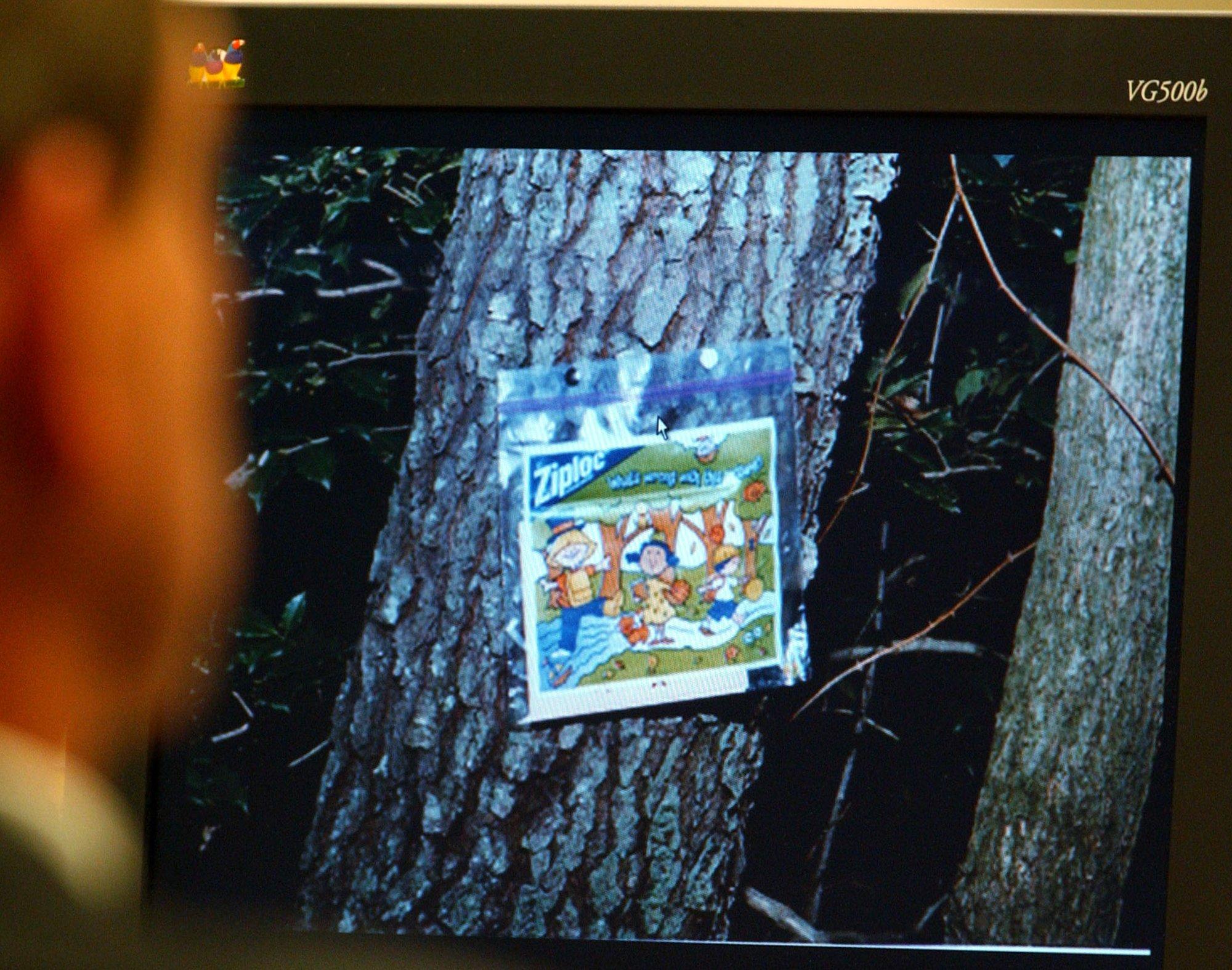
Evidence shown at John Muhammed's trial
Two days later, another man was killed at a gas station — this one in Fredericksburg, Virginia, just off a major freeway, I-95. Kenneth Bridges, 53, was visiting the area from Philadelphia when the snipers murdered him on Oct. 11th.
Police immediately set up a massive roadblock after Bridges was killed, which failed to find the right vehicle of interest. They believed a white van was involved in the shootings, but this lead later proved false.
THE NEVER-ENDING NIGHTMARE
Police were baffled by the randomness of the attacks, although one thing was clear: there was absolutely no connection between victims. Authorities debated whether they were dealing with a serial killer or spree killer and whether it was one person or several.
Investigators knew the shooter was a sniper and were certain the killer or killers were taking shots from a vehicle. However, as D.C. newspapers covered the killings, the coverage did nothing to quell fears. A panic enveloped the region. No one felt safe outside their home, as the victims were performing everyday tasks and died without warning.
Residents began avoiding public places and became hypervigilant about leaving the house.
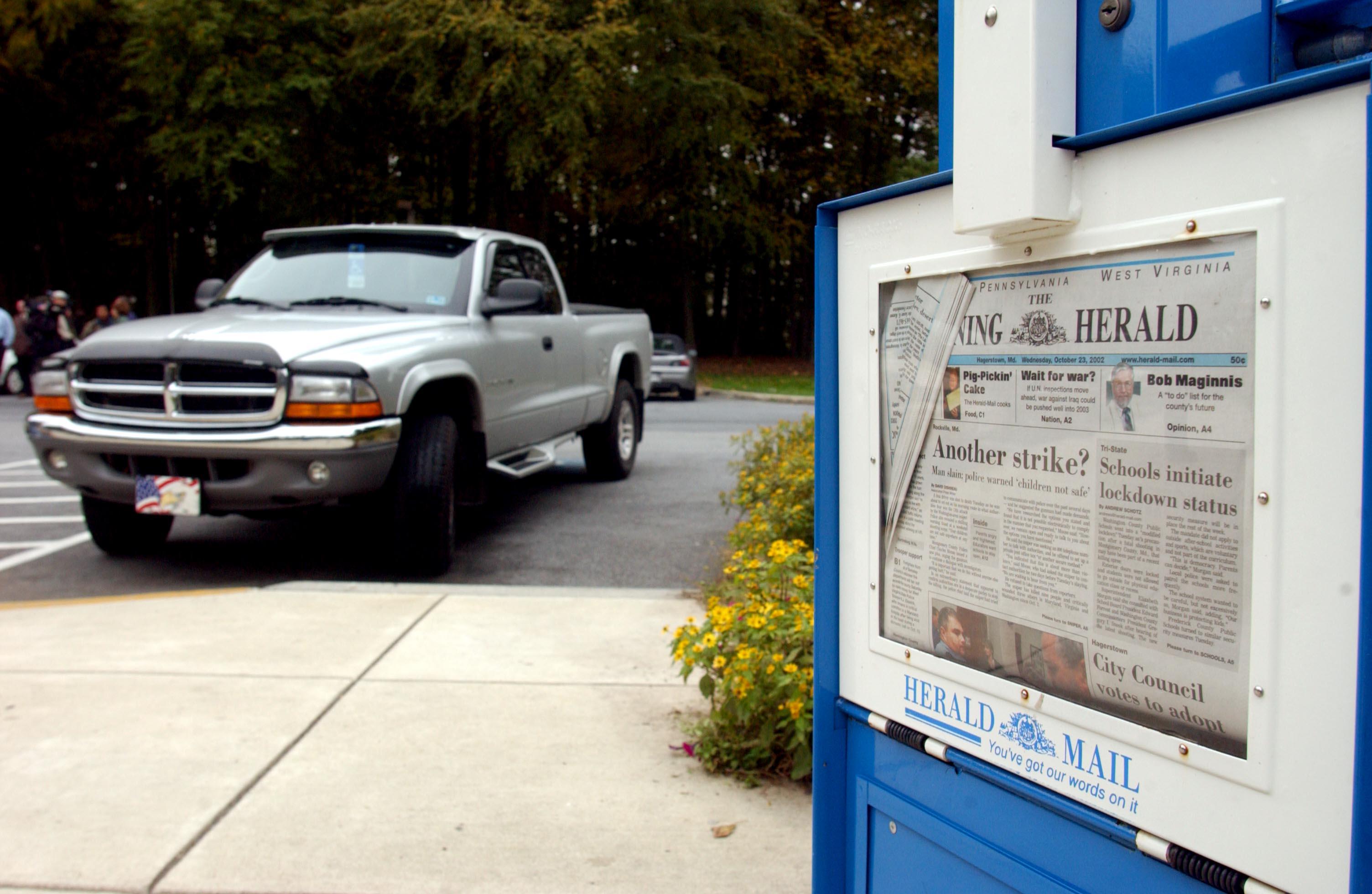
A newspaper box at the rest stop where the D.C. snipers were arrested
On Oct. 14, after a three-day hiatus, another shooting occurred in Falls Church, Virginia. A 47-year-old woman was shot to death in a Home Depot parking lot. A single shot ended Linda Franklin’s life while she was loading supplies into her car. Her husband Ted witnessed her death, helpless to save her as he called for police and ambulance. Franklin was an FBI analyst.
Five days later, a shooting occurred 80 miles south of Washington D.C.—in Ashland, Virginia, at a Ponderosa Steakhouse. Jeffrey Hopper, 37, underwent surgery and doctors saved the bullet, which was tied to the other crimes. Hopper survived the attack. Investigators found a note at the scene.
The last victim was Conrad Johnson, 35, a commuter bus driver. Johnson was standing on the steps of his bus at 6am, getting the bus ready for passengers that day, when he was shot. His bus was parked by the curb in Aspen Hill, Maryland D. He was transported to a nearby hospital, where he died. Johnson was a married father of two boys.
WHERE ARE THE D.C. SNIPERS NOW?
Both gunmen were arrested in the early morning hours of Oct. 24, 2002, after a civilian called authorities about a suspicious vehicle. Their 1990 blue Chevy Caprice was taken into custody as evidence.
The trunk had been converted to a sniper’s nest and fitted with a stolen Bushmaster XM-15 rifle with a holographic weapon sight. The .223 caliber firearm could accurately hit a target up to 300 meters [900 feet] away. Inside, authorities also confiscated binoculars and walkie-talkies.
In April 2005, the Virginia Supreme Court upheld the decision against Muhammed, and within four years, a circuit court judge set Muhammed’s execution date for November 2009. Although he appealed, claiming innocence, his pleas fell on deaf ears. No one, including Virginia Gov. Tim Kaine, would forget the terror they and their neighbors faced for three weeks in October.
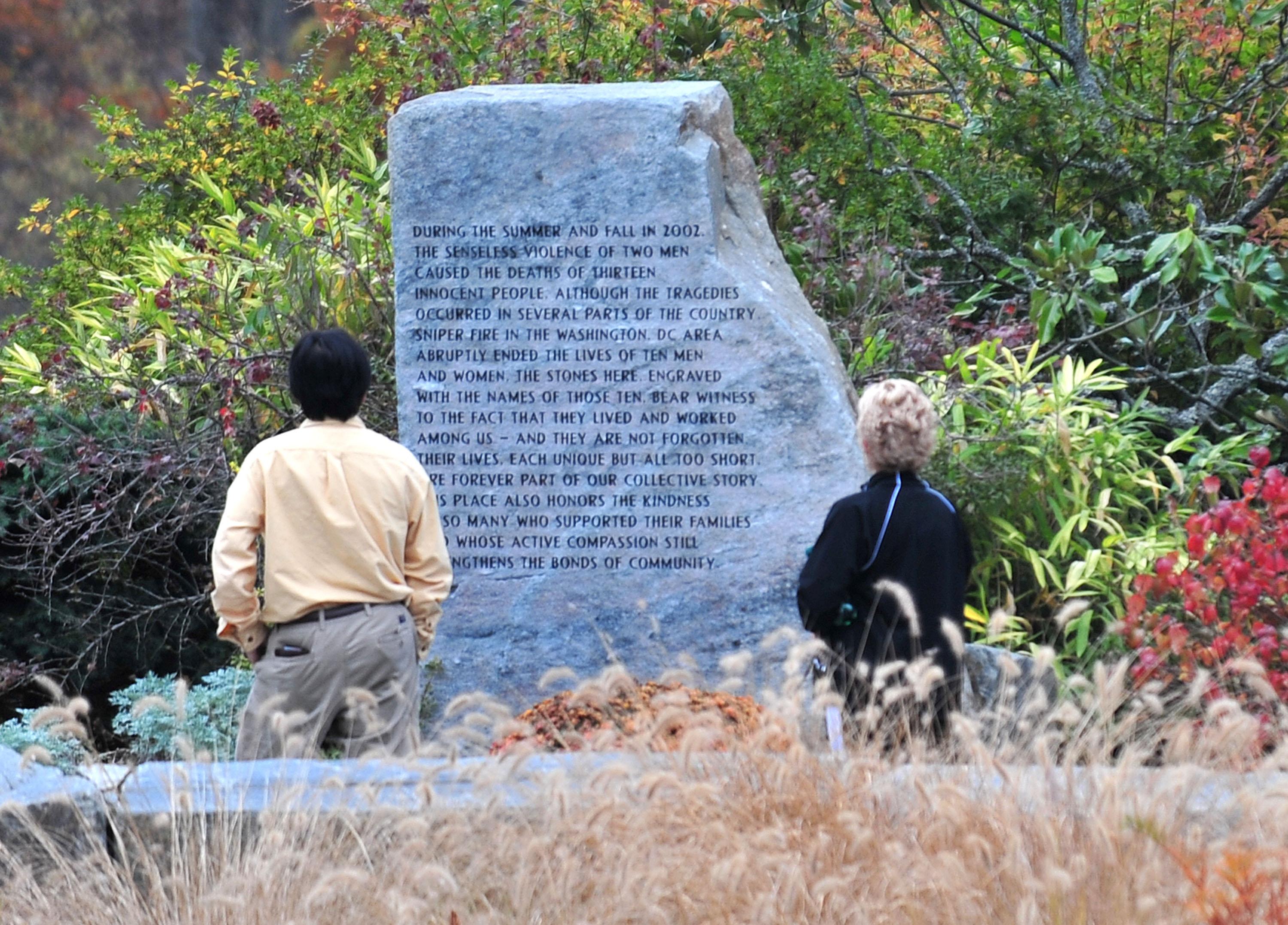
A memorial for the victims of the D.C. snipers.
After Kaine denied a request for clemency, the State of Virginia executed John Allen Muhammed on Nov. 10, 2009, at 9:06 pm at Greensville Correctional Center. Twenty-seven people, including several surviving victims, watched him die. He spoke no last words.
Malvo was tried separately in Virginia on three first-degree murder charges. He was found guilty and sentenced to three consecutive life terms without the possibility of parole. He was also tried in Maryland, where he received six consecutive life sentences, based on the number of victims he murdered there.
In March 2005, the Supreme Court ruled against juvenile executions.
Malvo was remanded to Red Onion State Prison in Wise County, Virginia.
In 2017, the 4th Circuit U.S. Court of Appeals vacated all Malvo's life sentences on appeal, making re-sentencing the next order of business. The Supreme Court's ruling in the case of Miller v. Alabama helped his case. The ruling made mandatory life sentences for juvenile criminals without the possibility of parole a violation of the Eighth Amendment.
Malvo has since made significant efforts to, in his words, “make amends” for the shootings.
On March 10, 2020, Lee Malvo got married in a prison ceremony.
Also in 2020, Malvo and his attorneys dropped their appeal to the Supreme Court. The new Virginia law made the appeal unnecessary because juvenile offenders there can become eligible for parole after serving 20 years.
He may be released from Red Onion State Prison as early as 2022, but it is unlikely he will be a free man — Malvo still faces multiple life sentences without parole in Maryland and would be transferred to another facility in that state.
WAS MALVO ANOTHER VICTIM?
In the nearly 20 years since the serial murders, Malvo has given several interviews. His words and actions point to an individual who feels deeply remorseful. There is evidence he was sexually abused by Muhammed.
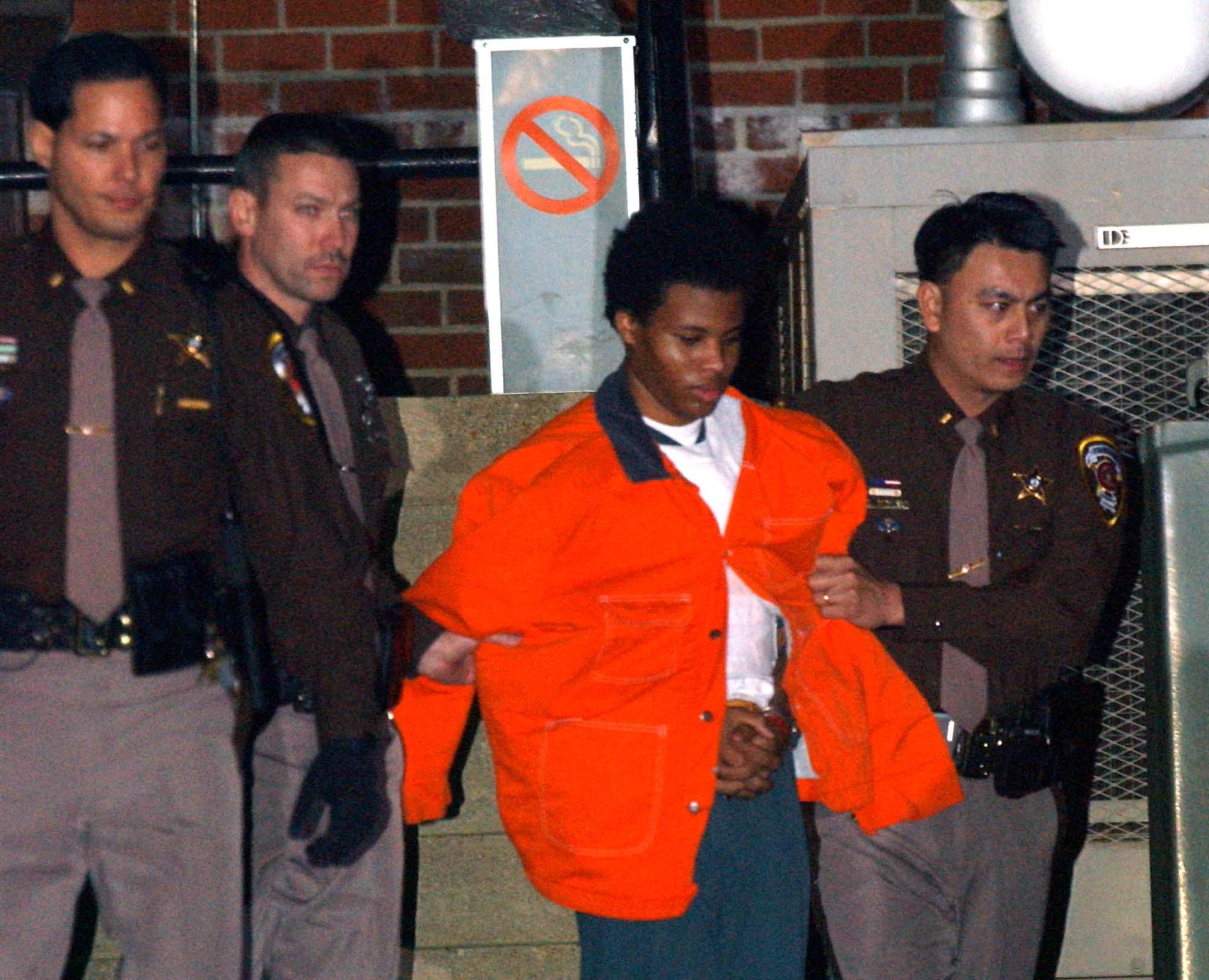
Lee Malvo after his arrest.
Malvo wrote letters to victim’s families to apologize for his actions. He has been a model prisoner. He has admitted to authorities that he lied during the first round of questioning — in an attempt to shield John Muhammed from facing the death penalty.
Malvo admitted he believed John Muhammed when he was told as a 16-year old that the purpose of their murderous rampage was to get a $10 million ransom from the federal government that they could use to build a Utopian society for 140 black homeless children in Canada.
While he is serving time in a Virginia prison, sniper attack survivors may be less inclined to believe the man is a different person than the teenager was. Many victims report just wanting to put the trauma behind them.
In 2006, Malvo admitted he and Muhammed carried out five other shootings in Los Angeles, Arizona, Texas, Louisiana and Florida. Two of the men they shot were golfing (one survived). The other victims all died except one — a man who they shot during a robbery in Baton Rouge.
Malvo is currently an eight-hour car trip from Washington, D.C., in a remote area of Virginia’s Appalachian Mountains at a supermax facility. Far from where he terrorized a city for three weeks in 2002.
Become a Front Page Detective
Sign up to receive breaking
Front Page Detectives
news and exclusive investigations.
